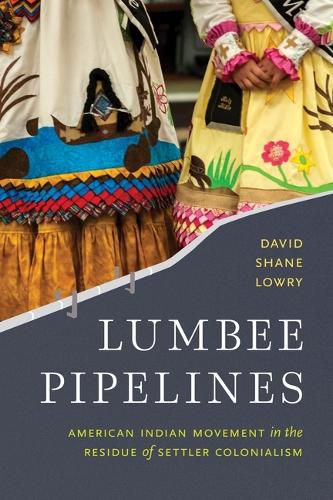Readings Newsletter
Become a Readings Member to make your shopping experience even easier.
Sign in or sign up for free!
You’re not far away from qualifying for FREE standard shipping within Australia
You’ve qualified for FREE standard shipping within Australia
The cart is loading…






In Lumbee Pipelines David Shane Lowry (Lumbee) examines the historical and modern paths, or "pipelines," through which members of the Lumbee Tribe of North Carolina maintain Lumbee national identity, community practices, and tribal sovereignty. Through extensive ethnographic research and contextualization, Lowry explores these pipelines: the programs and traditions through which the Lumbee people engineer the settler-colonial conditions that define life in North Carolina and the United States as a whole.
Even as the Lumbee community depends on the economics, politics, and histories of settler colonialism, those realities at once threaten Lumbee life, freedom, and community. Despite that conflict, Lumbee people use these pipelines to protect their interests and to influence the world in the realms of public infrastructure and education, healthcare services, humanitarian networks, fossil fuel pipelines, environmental degradation, and artificial intelligence. Lowry paints an intimate portrait of how individual Lumbees define their identities and sense of being, revealing the disputes and affinities between Lumbee community members in various states of accepting and rejecting settler-colonial circumstances.
Lumbee Pipelines engages conversations about how, even as American Indian identities and communities are often erased amid the business of contemporary American life, Lumbee people have devised ways to empower and enrich themselves and other peoples by repurposing and evading the genocidal pressures that define settler-colonial society.
$9.00 standard shipping within Australia
FREE standard shipping within Australia for orders over $100.00
Express & International shipping calculated at checkout
In Lumbee Pipelines David Shane Lowry (Lumbee) examines the historical and modern paths, or "pipelines," through which members of the Lumbee Tribe of North Carolina maintain Lumbee national identity, community practices, and tribal sovereignty. Through extensive ethnographic research and contextualization, Lowry explores these pipelines: the programs and traditions through which the Lumbee people engineer the settler-colonial conditions that define life in North Carolina and the United States as a whole.
Even as the Lumbee community depends on the economics, politics, and histories of settler colonialism, those realities at once threaten Lumbee life, freedom, and community. Despite that conflict, Lumbee people use these pipelines to protect their interests and to influence the world in the realms of public infrastructure and education, healthcare services, humanitarian networks, fossil fuel pipelines, environmental degradation, and artificial intelligence. Lowry paints an intimate portrait of how individual Lumbees define their identities and sense of being, revealing the disputes and affinities between Lumbee community members in various states of accepting and rejecting settler-colonial circumstances.
Lumbee Pipelines engages conversations about how, even as American Indian identities and communities are often erased amid the business of contemporary American life, Lumbee people have devised ways to empower and enrich themselves and other peoples by repurposing and evading the genocidal pressures that define settler-colonial society.